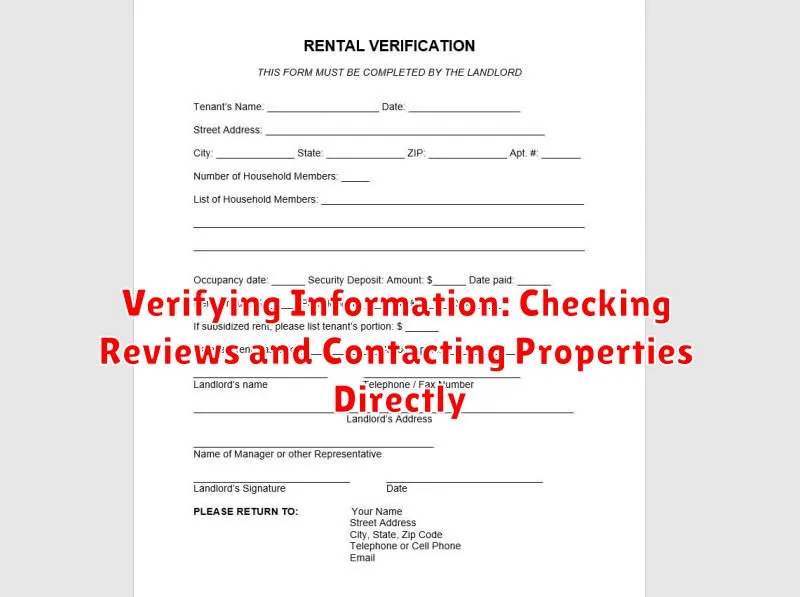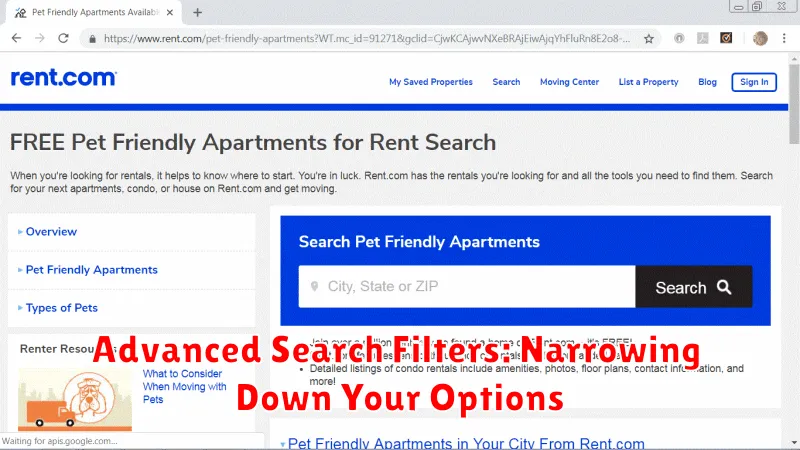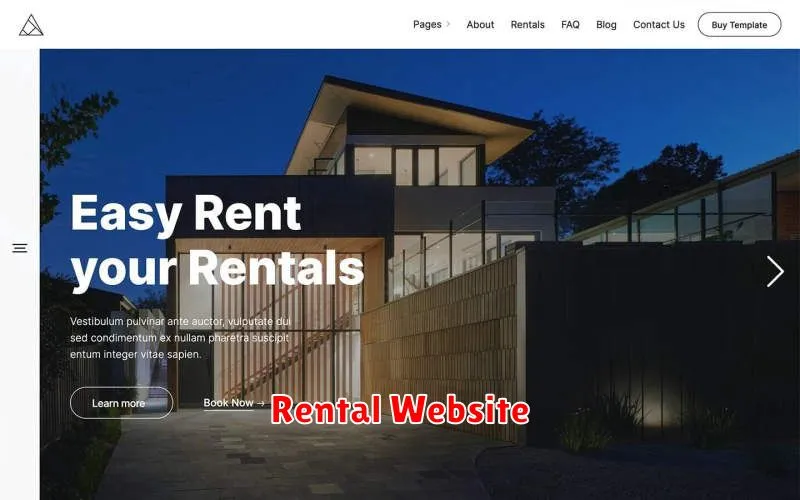Are you tired of endless scrolling through websites, only to find outdated listings or overpriced apartments? Finding the perfect place to rent can be a real hassle, but it doesn’t have to be. In this article, we’ll unveil the top websites for finding apartment rentals, empowering you to discover your dream home with ease. Whether you’re looking for a cozy studio in the city center or a spacious family home in the suburbs, these platforms will provide you with a comprehensive range of options, tailored to your unique needs and preferences.
Popular Apartment Search Engines: Features and Benefits
Finding the perfect apartment can be a daunting task, but several popular apartment search engines can streamline the process and help you find your dream home. These websites offer a wide range of features and benefits, making it easier to compare options, filter your search, and ultimately find the right apartment for your needs.
Zillow is one of the most well-known apartment search engines, known for its extensive listings, detailed property information, and user-friendly interface. Zillow allows you to filter your search by criteria such as price, bedrooms, bathrooms, square footage, and amenities. It also provides Zestimate, an estimated market value of a property, which can be helpful for assessing the price of a unit.
Apartments.com is another popular choice, offering a similar range of features to Zillow. It provides a comprehensive database of apartment listings, detailed property descriptions, and virtual tours for selected units. Apartments.com is known for its user-friendly interface and robust filtering options. You can find listings for apartments, houses, townhouses, and other rental properties.
Trulia is a search engine that focuses on providing a personalized experience for users. It allows you to create a customized search based on your preferences and location, helping you find properties that match your specific needs. Trulia also uses data and insights to estimate rental prices and offer detailed information about neighborhoods.
Rent.com is a comprehensive apartment search engine that offers a vast database of listings, user-friendly interface, and various features. It allows you to filter your search by price, location, amenities, and pet policies. Rent.com also provides resources for renters, such as guides, tips, and articles.
HotPads is a popular choice among renters looking for a user-friendly experience and a vast database of listings. It offers a unique feature called “Rentometer,” which provides insights into the rental market in specific locations. HotPads also has a focus on providing real-time updates on available units, making it a valuable tool for those looking for a quick and convenient search.
These are just a few of the many popular apartment search engines available. Each platform has its unique features and benefits, so it’s important to compare them to find the best fit for your needs. Whether you’re looking for a budget-friendly studio or a spacious three-bedroom apartment, these search engines can help you find the perfect place to call home.
Niche Rental Websites: Catering to Specific Needs and Preferences
While general rental websites like Zillow and Apartments.com are popular for finding apartments, niche rental websites offer specialized searches tailored to specific needs and preferences. These platforms cater to diverse demographics and lifestyles, offering a more focused and efficient search experience.
For instance, student housing websites connect students with off-campus apartments near universities. They often feature amenities like laundry facilities, social spaces, and proximity to campus resources. Similarly, pet-friendly rental websites focus on properties welcoming furry companions, providing a dedicated platform for pet owners.
Additionally, niche websites cater to specific lifestyle choices. Luxury rental platforms showcase high-end properties with premium amenities and services, while short-term rental websites connect travelers with temporary accommodations. Senior living websites provide resources and listings for retirement communities and assisted living facilities.
By leveraging niche rental websites, renters can save time and effort by narrowing their search to properties that align with their unique requirements. These platforms offer specialized filters, detailed property information, and community features, making the apartment hunting process more targeted and efficient.
Local Listing Services: Finding Hidden Gems and Off-Market Apartments
Local listing services are a valuable resource for finding hidden gems and off-market apartments that might not be listed on popular websites. These services often connect you with local real estate agents who have access to properties that aren’t yet publicly advertised. By working with a local agent, you can tap into their network and gain insight into upcoming listings or properties that haven’t hit the market yet.
Many local listing services allow you to search by specific criteria, such as location, price range, and desired amenities. You can also create a profile and set up alerts to be notified of new listings that match your preferences. Some services even offer virtual tours and 3D models to help you visualize properties before visiting them in person.
While popular websites like Zillow and Trulia are great starting points for apartment hunting, consider expanding your search to include local listing services. You might discover a hidden gem that you would have otherwise missed!
Using Social Media and Online Forums: Connecting with Landlords and Roommates
Social media and online forums are great resources for connecting with landlords and roommates. Facebook groups, Reddit threads, and even Nextdoor neighborhoods can offer you a chance to find listings that aren’t advertised on traditional rental websites, connect with people in your community, and ask for insider tips and advice. These platforms can also be helpful for finding roommates you’re compatible with, especially if you’re looking for a shared living arrangement.
When using these resources, be sure to be proactive in your search. Join groups and forums relevant to your area and search for posts related to rentals. Be clear and concise in your requests and be sure to specify what you’re looking for, including your budget, preferred location, and any other specific needs. Don’t be afraid to ask questions and network with others in your community.
By taking advantage of these platforms, you can expand your search beyond traditional rental websites and connect directly with landlords and potential roommates. This can lead to more personalized experiences, valuable insights, and potentially even faster results in your apartment hunt.
Comparing Listings: Rent Prices, Amenities, and Location
Once you’ve identified a few promising websites, it’s time to start comparing listings. This is where the real fun (and perhaps frustration) begins. You’ll need to consider a few key factors to determine which apartments are best for your needs and budget.
Rent Prices are obviously a major consideration, but don’t just focus on the lowest number. Factor in the size of the apartment, the neighborhood, and the included amenities. Sometimes a slightly higher rent can be justified by a better location or more desirable features.
Amenities can make a big difference in your overall enjoyment of an apartment. Consider things like in-building laundry, a gym, a rooftop deck, or even a pet-friendly policy. These features can add value to your living experience and make your life easier.
Location is another crucial factor. Think about your daily commute, access to public transportation, and proximity to shops, restaurants, and other amenities. It’s worth considering the neighborhood’s safety, walkability, and overall vibe.
Verifying Information: Checking Reviews and Contacting Properties Directly

Once you’ve found a few apartments that pique your interest, it’s crucial to verify the information you’ve gathered. While websites like Apartments.com and Zillow are valuable resources, they don’t always provide the complete picture.
Start by checking online reviews on sites like Google, Yelp, and Facebook. These reviews offer firsthand insights into the property’s management, maintenance, and overall living experience. Look for recurring themes or red flags that might raise concerns.
Next, reach out to the property directly. This allows you to ask specific questions that may not be covered on the listing, such as:
- Availability of parking and laundry facilities
- Details about the neighborhood and amenities
- Lease terms and pet policies
- Any recent renovations or upgrades
Speaking with a property manager or representative can provide you with a more accurate and personal understanding of the property.
Remember, verifying information before committing to a rental is essential. It helps you avoid any unpleasant surprises and ensures that you find an apartment that truly meets your needs.
Advanced Search Filters: Narrowing Down Your Options

Advanced search filters are your best friend when it comes to finding the perfect apartment. They allow you to narrow down your search results based on specific criteria, making it easier to find rentals that match your needs and budget.
Most apartment rental websites offer a wide range of filters, including:
- Price: Set a budget range and avoid wasting time on listings that are out of your price range.
- Location: Specify the neighborhood or zip code you prefer. Some websites even allow you to draw a custom search radius around a specific address.
- Number of bedrooms and bathrooms: This is essential for determining the size and layout of the apartment you need.
- Amenities: Look for features like laundry facilities, parking, a gym, a pool, or a pet-friendly environment.
- Building type: Choose from apartments, condos, townhouses, or studios, depending on your preference.
- Move-in date: This is helpful if you have a specific date in mind.
- Lease length: Some listings require a 12-month lease, while others offer shorter-term options.
Using these filters can save you time and effort by eliminating irrelevant listings. You can also explore other features, such as viewing virtual tours, reading reviews from previous tenants, and contacting landlords directly through the website.
Tips for Effective Online Apartment Hunting
Finding your perfect apartment can be a daunting task, especially if you’re starting your search online. But with a little strategy and know-how, you can navigate the digital landscape of apartment rentals with ease. Here are some tips for effective online apartment hunting:
Be clear about your needs and wants. Before you dive into the listings, take some time to determine what’s most important to you. Consider your budget, desired location, and any specific features like a balcony or in-unit laundry. Knowing your priorities will help you narrow down your search and avoid wasting time on listings that don’t fit your criteria.
Utilize advanced search filters. Most online apartment rental websites offer advanced search filters that allow you to refine your search by price, square footage, number of bedrooms and bathrooms, pet policies, amenities, and more. Take advantage of these filters to quickly eliminate listings that don’t meet your needs.
Be wary of scams. Unfortunately, scams are prevalent in the online rental market. Be cautious of listings that seem too good to be true, especially if they require you to send money before viewing the apartment. Always verify the legitimacy of the listing and the landlord before providing any personal information or financial details.
Read reviews and check reputation. Before contacting a landlord or scheduling a viewing, take some time to research their reputation. Check online reviews from previous tenants and see if there are any red flags. You can also use tools like Google Maps to see if there are any complaints or negative reviews associated with the property.
Contact landlords directly. Once you find a few listings that interest you, reach out to the landlords directly to ask questions and gather more information. Don’t be afraid to ask about things like the lease terms, availability, and the landlord’s policies on pets, parking, and utilities.
Be prepared to be flexible. The perfect apartment might not be available right away. Be open to considering different options and be prepared to be flexible with your criteria. Remember, the search for a new apartment is a process, and it may take some time to find the right fit.
Avoiding Rental Scams: Identifying Red Flags and Protecting Yourself

Finding a new apartment can be exciting, but it’s crucial to be cautious and aware of potential scams. Scammers often target renters, especially those looking for deals or in a hurry. Knowing how to identify red flags and take precautions can help you avoid becoming a victim.
Here are some common red flags to watch out for:
- Unusually low rent: If the price seems too good to be true, it probably is. Be skeptical of deals significantly lower than the average for the area and apartment type.
- Pressure to act quickly: Scammers often try to rush you into making a decision before you have a chance to properly investigate. They may use phrases like “first come, first served” or “limited time offer” to create a sense of urgency.
- Lack of a physical meeting: A legitimate landlord should be willing to meet you in person to show you the property. Be wary if the landlord insists on communicating only via email or phone and refuses to meet in person.
- Requesting payment before viewing: Never send money to a landlord before seeing the property in person. A legitimate landlord won’t ask for rent or security deposits until after you’ve signed a lease agreement.
- Suspicious websites or email addresses: Be cautious about websites or email addresses that look unprofessional or lack basic security features. Check the URL for typos or misspellings.
- Asking for personal details over email: Avoid sharing sensitive information like your Social Security number or bank account details in an email.
To protect yourself:
- Research the landlord and property: Look up the landlord’s name and address online to see if there are any complaints or negative reviews. Check local property records to verify that the landlord owns the property.
- See the apartment in person: Never sign a lease agreement without physically seeing the apartment. Take pictures and make notes of the condition of the unit.
- Read the lease carefully: Before signing, review the lease agreement thoroughly and understand all the terms and conditions.
- Use a secure payment method: If you must make payments before moving in, use a secure payment method like a cashier’s check or money order. Never use Western Union or MoneyGram for rental payments.
- Report scams: If you suspect you’ve been a victim of a scam, report it to the local police and to the Federal Trade Commission.
By being informed and taking precautions, you can avoid rental scams and find a safe and comfortable place to live.
Making the Most of Online Resources: Streamlining Your Search
Finding the perfect apartment can feel like a daunting task, especially with the vast number of online resources available. However, by strategically utilizing these platforms, you can significantly streamline your search and find your dream apartment with ease.
To begin, it’s crucial to define your needs and preferences. Consider factors such as budget, location, desired amenities, and size. This will help you narrow down your options and focus on apartments that truly align with your requirements.
Next, take advantage of the powerful filtering options offered by most apartment rental websites. These filters allow you to specify criteria like price range, number of bedrooms, pet policies, and even building features. This feature saves you valuable time by automatically removing irrelevant listings.
Don’t hesitate to utilize the search bar to find specific properties or neighborhoods. You can enter keywords like “luxury apartments,” “studio near public transportation,” or “pet-friendly buildings.” This ensures your search is tailored to your unique preferences.
Remember to explore the website’s advanced features. Many platforms provide tools for saving your favorite listings, creating email alerts for new properties matching your criteria, and even scheduling virtual tours. These features empower you to stay organized and efficiently manage your search process.
Lastly, consider using multiple websites to broaden your search. Each platform might have different listings or emphasize specific neighborhoods. By casting a wider net, you increase the likelihood of finding the ideal apartment that fits your needs.
By embracing these tips, you can turn your apartment search from a stressful chore into a focused and productive endeavor. Happy hunting!

